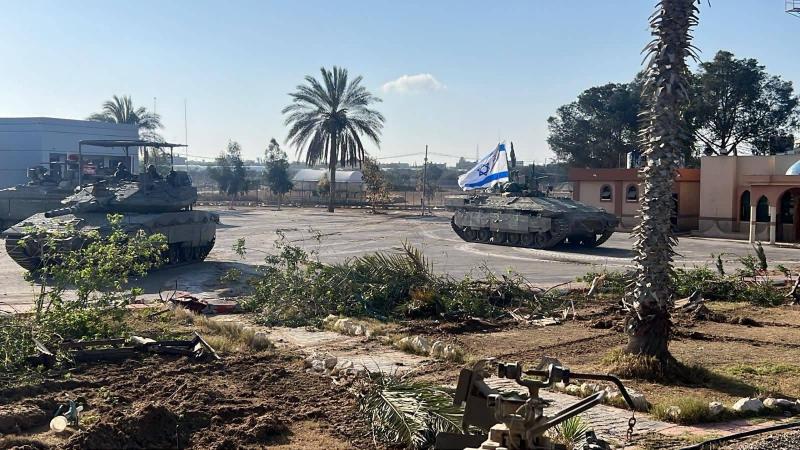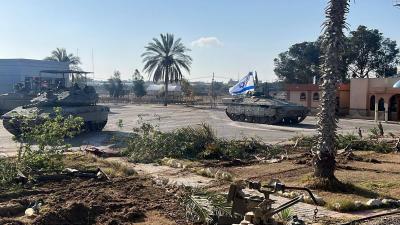A larger and more dangerous conflict may erupt in the region involving several countries, including Iraq, if a ceasefire in Gaza is not reached soon. The American magazine "Newsweek" reported that Hezbollah in Lebanon is "Iran's strongest ally in the Middle East and the most heavily armed," noting that former Israeli officials warned that the current path towards war, fueled by intense cross-border clashes and fiery rhetoric, could lead the region into an entirely unknown phase.
The American report quoted former Israeli official Eran Etzion, who served as the Deputy Head of the Israeli National Security Council during the last war between Israel and Lebanon in 2006, stating, "It is very difficult to see how victory can be achieved quickly in this war, if it is won at all," adding, "I think it will be a war that Israel will lose within the first 24 hours, simply due to the images we will see of widespread devastation in highly sensitive areas within Israel at a level we have not witnessed before."
The report highlighted that "focus is increasing on the escalating battle in the north between the Israeli army and Hezbollah, which has significantly improved its arsenal since the 2006 war." Israeli military officials say the group currently possesses around 200,000 rockets, in addition to mortars, drones, surface-to-air missiles, anti-tank weapons, and precision missiles.
The American report also quoted Shmuel Meir, former head of the Arms Control Division in the IDF's Strategic Planning Directorate, who stated that Iran "built Hezbollah’s long-range missile arsenal for one strategic purpose: to serve as an offensive defense to deter Israel from attacking its nuclear facilities," adding that this "explains the Iranian activity and the repeated visits of senior officials to Beirut, to ensure that Hezbollah does not waste its missile arsenal as it did in the 2006 Lebanon War."
The report noted that "many of these weapons are being used in the ongoing confrontations," indicating that Hezbollah recently claimed to have destroyed the first batteries of the Iron Dome system. The Israeli army also acknowledged that recent strikes carried out by explosive-laden drones and a barrage of rockets ignited massive fires in northern Israel, which has been largely evacuated.
According to Israeli officials, around 80,000 people have been displaced from communities in northern Israel since October 7, while the UN Office for the Coordination of Humanitarian Affairs estimated that approximately 93,000 have been displaced from southern Lebanon due to the conflict.
The report suggested that what may occur between Lebanon and Israel could surpass current casualty figures in the ongoing war in Gaza due to the level of firepower and human resources likely to be utilized by both sides. However, according to Meir, "this is a war that neither side can win because of the balance of enormous mutual destruction of population centers."
The report quoted Meir as saying, "A large-scale attack by the Israeli army and an invasion of Lebanon, as some politicians demand, will lead to Hezbollah retaliating with large-scale rocket attacks on Haifa and Tel Aviv."
The report continued that "Netanyahu, during his visit to an Israeli military base near the recently affected border city of Kiryat Shmona, pledged to restore security in the area, affirming, 'We are prepared to carry out very intense operations in the north.'"
Newsweek further stated, "While Netanyahu and other senior Israeli officials are now publicly discussing the possibility of a new war with Hezbollah, the group has downplayed Israeli rhetoric and announced its readiness to respond to any threats from Israel."
A statement attributed to a Hezbollah spokesperson claimed, "Since October 7, the Israelis have been threatening, but those who have a loud voice cannot do anything," adding that they "have not emerged from their quagmire in Gaza after eight months with any achievement other than killing civilians and innocent children," pointing out that the group "is always ready for anything and will defend its citizens and land without hesitation."
The report also quoted Doron Avital, former commander of the Israeli army's elite unit Sayeret Matkal, stating that the current security situation on the border is "crazy," adding that there will be a "price" that Israeli population centers like Haifa will pay due to Hezbollah's long-range capabilities. He also warned that the Israeli pursuit of destroying Lebanese military and civilian infrastructure, given the international backlash Israel has already felt throughout its campaign against Hamas, may lead to significant consequences.
Avital continued, "I do not want to wage war in Lebanon without coordination with the United States, which does not want this either, and we must acknowledge the destruction we have inflicted on Gaza. It will be difficult for our allies to see this kind of destruction inflicted on Beirut."
### Resistance Axis
He viewed that "American support will be crucial because even a limited operation could lead to a deterioration towards a larger war, which could also drag other factions from the 'Resistance Axis' allied with Iran that have already claimed responsibility for almost daily operations in Iraq and Yemen against Israel," recalling that Iran had already launched missiles and drones against Israel in April in response to the Israeli assassination of senior Iranian military officials in an Iranian consulate building in Syria.
However, the report cited Etzion, the former Deputy Head of the National Security Council, stating, "You can imagine a slide in the Israeli cabinet starting with the ongoing conflict in Gaza, jumping to a full-scale war with Hezbollah, and then leading to direct Iranian intervention and broader involvement from other Iran-aligned militias in Syria and Iraq and the Houthis in Yemen," adding that "the two major leaps in this extremely complex situation are Hezbollah and Iran."
### Containing the Conflict
According to Etzion, "the likelihood of further escalation increases with each phase, and as soon as Hezbollah enters, the likelihood of Iran entering also grows, and the degree of involvement of those other militias grows substantially."
The report recalled the American president's announcement about ten days ago regarding a three-stage roadmap for a ceasefire between Israel and Hamas and prisoner exchanges, saying: "Once a ceasefire and a hostage agreement (in Gaza) are reached, this will open up the possibility of achieving greater progress, including calm along Israel's northern border with Lebanon."
The report pointed out ongoing behind-the-scenes efforts to prevent any potentially uncontrollable escalation, quoting Meir's indication of reports talking about "back channels for ongoing communication between Iran and the United States via the Swiss embassy in Tehran and secret meetings in Amman."
According to the report, it became clear that the United States and Iran have a common goal, which is to contain the war and limit it to the Lebanese border to prevent escalation that leads to unintended and unwanted results."
It concluded that Lebanese officials are also concerned about the potential costs of the conflict on their territory, which could have far-reaching consequences for the Middle East and what might "drag the region into the abyss."
The American report ended with Lebanese officials stating that a widespread war, if it occurs, "will be unprecedented, of a broader geographic scale, and multi-party and multi-front."




